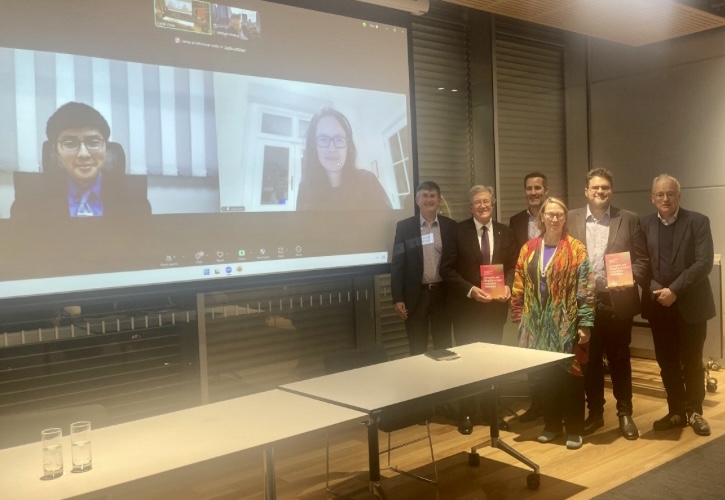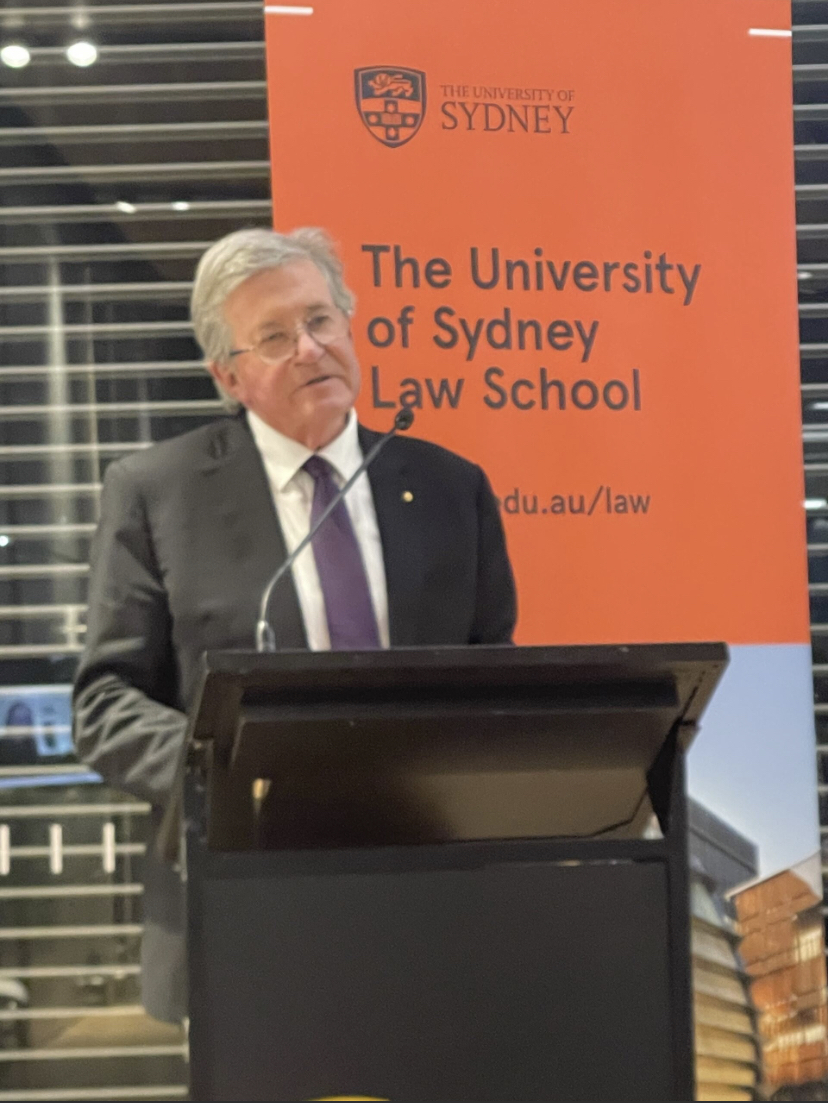Written by: Luke Nottage (University of Sydney) and Nobumichi Teramura (Universiti Brunei Darussalam)
[Ed. Note: Our related new book (open access through Springer) was launched by the Attorney-General of Brunei at a symposium held there on 28 May 2024 (as reported here). A follow-up seminar and local re-launch by former Chief Justice of Western Australia Wayne Martin (pictured below with other book contributors/speakers), including some new research emerging from the book, was held at USydney Law School on 1 August (further details here, with Nobu Teramura’s presentation/overview Powerpoints also for LSA conference presentation here). Many thanks to all involved in this book project, including for funding from the Centre for Asia-Pacific Law at the University of Sydney (CAPLUS), Universiti Brunei Darussalam, and the University of Wollongong’s Transnational Law and Policy Centre.


A version of the Blog posting below, re-titled “Corruption Control Needs a Clean-Up in Asia”, was published on 18 July 2024 by the East Asia Forum – thanks to their editors and an anonymous reviewer.]
Corruption remains a serious problem in most parts of Asia. The economic effects are serious, regionally and globally, and the COVID-19 pandemic sometimes made the situation worse. Emergency measures for government procurement and management of the economy expanded opportunities for graft and impacted adversely on enforcement activities.
This problem has persisted for many years despite many new legal instruments aimed at or potentially impacting on corruption, as explored also in our recent book (open-access, so PDFs freely downloadable).
First, the OECD Convention (signed from 1997), prompted by the US enacting the Foreign Corrupt Officials Act two decades earlier, focused on the ‘supply side’. Developed economy member states (including Japan and Korea in Asia) committed to criminalising at home the bribery of foreign officials. Secondly, the UN Convention (signed from 2005, by almost all Asian states) covered bribery of both domestic and foreign officials, including also the ‘demand side’ (solicitation and receiving bribes).
However, the commitments under these multilateral treaties are often quite general, not setting for example any minimum criminal penalties for bribery. As Anselmo Reyes elaborates in his co-authored chapter, both treaties also leave open the possibility of allowing ‘facilitation payments’ – smaller ‘grease money’ payments to expedite routine government transactions like permits. Canada disallowed these under 2017 legislation but Australia’s 2024 amendments retain this possibility – perhaps reflecting the arguments of some economists (investigated in our book by Ahmed M Khalid, Bruno Jetin and others with econometric studies) that such low-level bribery in fact may be efficient.
In addition, even for the core commitments under both treaties, there is not much incentive for transparent and effective enforcement by member states. This is especially true in developing economies with less media freedom and/or democratic accountability – also under pressure. Scrutiny of enforcement under these treaties relies mainly on ‘peer review’ mechanisms that take years to implement, and recommendations on member states for improvements are not binding.
Some states have created new anti-corruption agencies and even courts, as in Indonesia and Thailand, but have faced political backlash. Others, like Vietnam and China, have sometimes vigorously enforced anti-corruption laws (including through the death penalty), but some suspect this is done selectively for political purposes.
A few Asia-Pacific states (such as Thailand and now in Australia) have followed the lead of the UK’s Anti-Bribery Act 2010, which specifically sanctions firms that do not take reasonable measures to introduce anti-bribery compliance schemes. This makes mandatory a feature of the opt-in UN Global Compact scheme that (larger) companies have started to sign up to. They may anyway be conscious of pressures from investors influenced by environmental, social and governance (ESG) considerations.
This slow and sporadic transition towards taking corruption more seriously is also evident in provisions found in free trade agreements (FTAs) entered into by developed countries and regions: the EU, the US, Canada and (notably in Asia) Japan. These treaties also commit member states to both enact and enforce anti-bribery laws. They are reflected in some ‘mega-regional’ FTAs like the Regional Comprehensive Economic Partnership (Chapter 17) and in more detail the Comprehensive and Progressive Agreement for Trans-Pacific Partnership (Chapter 26), but curiously not in the recently signed Second Protocol to the ASEAN Australia New Zealand FTA (except regarding government procurement: Chapter 17).
Typically, however, these treaties too are broadly worded, and corruption-related enforcement issues are not subject to their inter-state dispute settlement provisions that help make the commitments more credible. This limitation also seems to apply to the new WTO Investment Facilitation Agreement (although its text is not yet public).
Corruption issues have been cropping up also increasingly, especially from around 2010, in investor-state dispute settlement (ISDS) arbitrations initiated under FTA investment chapters or standalone bilateral investment treaties (BITs). Occasionally under such international investment agreements (IIAs), a foreign investor claims compensation because host state officials solicited a bribe in contravention of the ‘fair and equitable treatment’ commitment under the IIA.
More often, the host state raises as a defence against an ISDS claim that the allegation that the foreign investor made a bribe when making the investment, so it is not covered under the IIA. If the arbitral tribunal agrees, it may decline jurisdiction, so the investor loses all treaty rights under international investment law and is left to the vagaries of host state law and court procedures. This typically arises where the IIA specifies expressly that it only covers investments made ‘in accordance with host state law’. Such outcomes may indeed incentivise foreign investors to avoid any form of bribery.
However, what evidence will prove such bribery, especially given that arbitrators (unlike anti-corruption agencies or courts) lack powers vis-à-vis third parties (like banks)? What if the alleged corruption is minor, vigorously solicited by public officials, commonplace and/or systemic in the host state? And what if it leads to the perverse incentive of the host state deliberately seeking a bribe, never enforcing sanctions against the official, but keeping evidence of the bribe as a ‘get out of jail free card’ if ever the foreign investor brings an ISDS claim after the host state discriminates or otherwise violates substantive commitments given under the IIA to encourage inbound investment? Focusing on East and South Asia, we and other authors in our book focus on possible more nuanced solutions for such scenarios, under existing or revised IIAs.
Overall, addressing corruption requires a careful assessment of its various manifestations, some much worse than others (as argued for China, for example). But it should also carefully consider the procedural mechanisms under both national law and international treaty law that help ensure appropriate enforcement of substantive commitments made by states.
